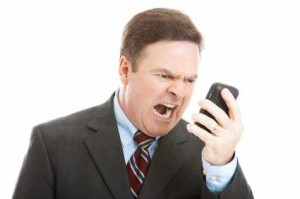Apologize, Or You’ll Be Sorry
The legal industry’s allergy to apologizing is damaging us all professionally and personally.
 In 1995, Georgetown Professor Deborah Tannen wrote about an experience with an attorney that still scans as frighteningly plausible today. Tannen reported in Harvard Business Review, “I observed with some amazement an encounter among several lawyers engaged in a negotiation over a speakerphone. At one point, the lawyer in whose office I was sitting accidentally elbowed the telephone and cut off the call. When his secretary got the parties back on again, I expected him to say what I would have said: ‘Sorry about that. I knocked the phone with my elbow.’ Instead, he said, ‘Hey, what happened? One minute you were there; the next minute you were gone!’”
In 1995, Georgetown Professor Deborah Tannen wrote about an experience with an attorney that still scans as frighteningly plausible today. Tannen reported in Harvard Business Review, “I observed with some amazement an encounter among several lawyers engaged in a negotiation over a speakerphone. At one point, the lawyer in whose office I was sitting accidentally elbowed the telephone and cut off the call. When his secretary got the parties back on again, I expected him to say what I would have said: ‘Sorry about that. I knocked the phone with my elbow.’ Instead, he said, ‘Hey, what happened? One minute you were there; the next minute you were gone!’”
How many of us can instantly picture someone we work with pulling this kind of two-bit stunt?! I fear it’s far too many. I’ve discussed in this space before how bad lawyers traditionally are at admitting when they’re wrong. I’d argue we’re even worse when it comes to actually apologizing for our errors and bad behavior.
The Sorry State

How The New Lexis+ AI App Empowers Lawyers On The Go
The practice of law isn’t exactly structured to teach us to give apologies to those we’ve wronged. Quite the opposite, actually. Many of us spend most of our time locked in adversarial situations, advocating on behalf of others. Whether we’re negotiating deals across a table or arguing cases across a courtroom, we often find ourselves wanting to project power and authority, or at the very least unimpeachable competence and dogged pursuit of our clients’ goals. The conventional wisdom many of us are taught or absorb is that apologies negate that professional image we try to cultivate when heading out into the world to do our jobs.
Apologies are implicitly a recognition that both the giver and receiver are subject to an equal playing field, governed by rules and norms that are larger than the specific circumstances we find ourselves in. By apologizing, we’re acknowledging that we did something wrong and that we owe some social debt or obligation to the recipient of the apology. Admitting that can seem, to some of us, unacceptable when engaging in legal battles where every inch of metaphorical battleground counts. Why show a sign of weakness to opposing counsel, who might use that weakness to our client’s disadvantage?
The problem with this philosophy is that apologies exist for a reason. They’re a necessary social construct, a way of acknowledging and making amends when we’ve damaged our relationship with someone. Thousands of years of cultural development have given us a bounty of ways to apologize and repair the wrongs we’ve committed. When we convince ourselves that apologies are an unacceptable sign of weakness, we’ve taken an important tool out of our toolkits. Chefs don’t cook food without salt. Painters don’t work without brushes. Why should attorneys, who are fundamentally communicators, leave one of our most important tools unused?
The mindset that apologizing is a sign of weakness is deeply toxic to its adherents, both personally and professionally. On the professional side, refusing to acknowledge wrongs done damages our standing in our communities and often makes our work more difficult. I could probably list 10 opposing counsel off the top of my head that I dislike working with because I know they’ll abuse my team without even a hope of apology. My cases against those attorneys are uniformly less pleasant, more time-intensive, and less efficient for everyone involved, whether client, attorney, courthouse personnel, or professional staff. It’s bad for everyone’s sanity, bad for clients’ bottom lines, and bad for the practice.
Sponsored

How The New Lexis+ AI App Empowers Lawyers On The Go

Curbing Client And Talent Loss With Productivity Tech

AI Presents Both Opportunities And Risks For Lawyers. Are You Prepared?

Curbing Client And Talent Loss With Productivity Tech
Not Just Wrong, But Harmful
The basic premise is also, to some extent, bull. Refusing to acknowledge that you’re wrong doesn’t make you strong or tough. It makes you unreflective, crass, and probably less effective than you could otherwise be. Anyone who’s studied negotiation in depth for any amount of time will tell you that brute-force dominance is rarely a winning negotiation strategy. Finesse, rapport, and finding unexpected common ground are usually far more effective, and apologizing for wrongs done can actually be an asset to those strategies, rather than a detriment.
The anti-apology mindset also unfairly undercuts those attorneys who don’t subscribe to it. Some attorneys aren’t afraid to recognize the wrongs they do and take care of others around them by apologizing. In work environments where apologizing is seen as weakness, these attorneys can be looked down upon or dismissed, consciously or not.
Bringing It Home
We also should remember that, as Kurt Vonnegut said, we are what we pretend to be. When we adopt an all-offense, no-apologies mindset for our work against other attorneys, that mindset tends to bleed into our nonprofessional lives. No one should treat their spouse, children, or loved ones the way they treat opposing counsel, but maintaining a firm divide between those worlds is tricky at best. If we spend 2,000 hours a year at work treating apologies as a sign of weakness, why would we be surprised if we continued doing that during our off hours? If you ask Malcolm Gladwell, by our fifth year we’ve basically trained ourselves into experts at disregarding the wrongs we do to others. If we spend our days being bullies, we’ll probably spend our nights as bullies, too.
Sponsored

Happy Lawyers, Better Results The Key To Thriving In Tough Times

Law Firm Business Development Is More Than Relationship Building
Pushing back or emphatically making a point can be part of practicing law, and unless something fundamental changes about the human psyche, learning to deploy an apology from time to time is going to be a skill every attorney needs to learn. That’s still no excuse for being a jerk. Our business is one of communication and relationships. If we can’t allow ourselves to take care of one another, to acknowledge our mutual humanity and apologize when we hurt someone else, we’re making ourselves worse attorneys and worse people. That’s simply not an acceptable outcome.
Our profession stinks at apologizing. Recognizing that apologies are a sign of compassion, and not weakness, is a good first step.
 James Goodnow is the CEO and managing partner of NLJ 250 firm Fennemore Craig. At age 36, he became the youngest known chief executive of a large law firm in the U.S. He holds his JD from Harvard Law School and dual business management certificates from MIT. He’s currently attending the Cambridge University Judge Business School (U.K.), where he’s working toward a master’s degree in entrepreneurship. James is the co-author of Motivating Millennials, which hit number one on Amazon in the business management new release category. You can connect with James on Twitter (@JamesGoodnow) or by emailing him at [email protected].
James Goodnow is the CEO and managing partner of NLJ 250 firm Fennemore Craig. At age 36, he became the youngest known chief executive of a large law firm in the U.S. He holds his JD from Harvard Law School and dual business management certificates from MIT. He’s currently attending the Cambridge University Judge Business School (U.K.), where he’s working toward a master’s degree in entrepreneurship. James is the co-author of Motivating Millennials, which hit number one on Amazon in the business management new release category. You can connect with James on Twitter (@JamesGoodnow) or by emailing him at [email protected].







